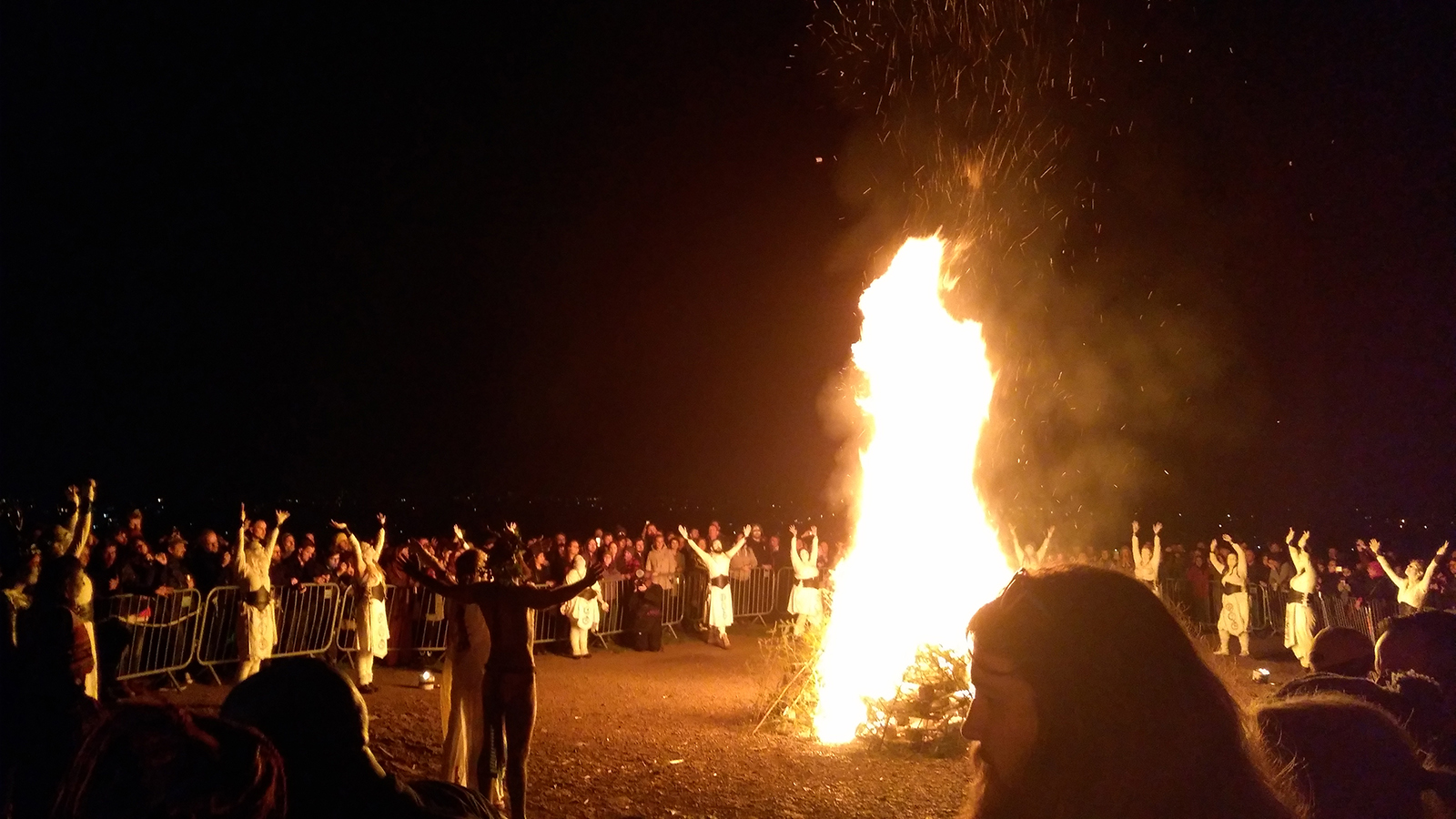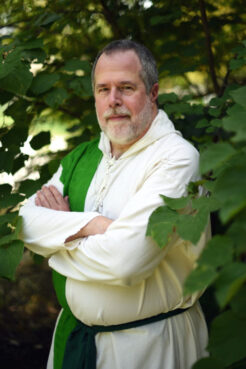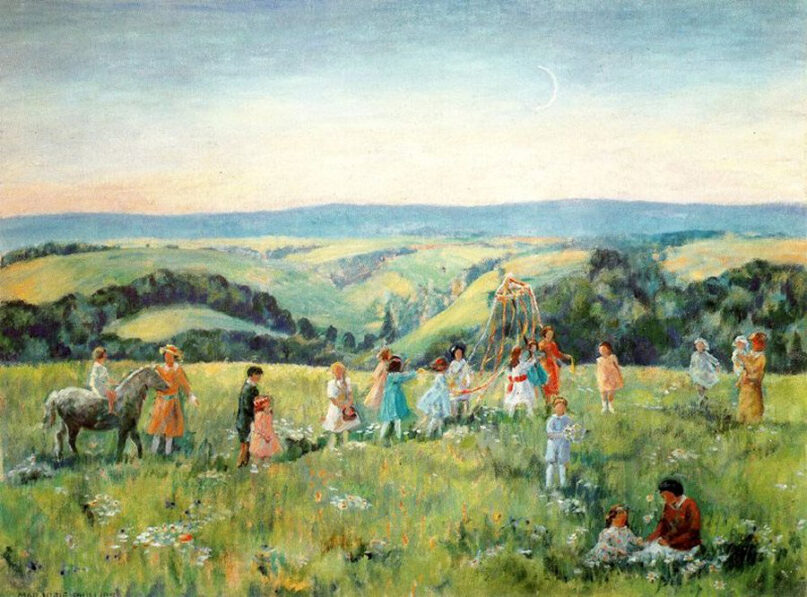(RNS) — On Sunday (May 1), some localities put up a traditional Maypole, named a May Queen and made flower crowns. Many modern pagans also celebrated the height of spring.
But one community’s vernal romp is another’s religious rite. “The life force is in everything,” explained the Rev. Wendy Van Allen, a Wiccan and spiritual counselor. “Nature is the holy book.”
May Day in Wicca and other pagan religions is celebrated as Beltane, a fertility festival originating in Celtic culture before Christianity.
And for some pagans honoring nature is enough. “In Atheopaganism,” said author Mark Green as Beltane approached this year, “we just say, here is the environment of planet Earth, and it’s sacred, and we are going to devote ourselves directly to that.”
RELATED: How some ‘Jewitches’ are embracing both Judaism and witchcraft
But Earth-focused celebrations of the seasons often lead to a misunderstanding in the broader culture that all pagan religions are pantheist — the belief that a faceless spirit of the divine lives in all living things. In most Wiccan traditions, Beltane marks the joining of the god and goddess, the religion’s two main deities. The Maypole dance itself is symbolic of their union.

The Rev. Wendy Van Allen. Courtesy photo
For many, the two divine beings are not entirely separate. Van Allen believes that the god and the goddess are two aspects of a single, genderless creator, not unlike the Eastern concept of yin and yang. Any other gods that Wiccans may call on in their rituals and spellwork serve as aspects of these two, she said.
Indeed, in addition to Wicca, Van Allen practices Lucumi, a tradition also known as Santeria, and is a priest of Obatala. Lucumi is not typically labeled as paganism at all but is an Afro-Caribbean religion. Lucumi’s spiritual beings, the Orisha, are not gods per se, but “forces of nature emanating out of the divine,” said Van Allen. But they are beings that believers can align with and find help in.
Other pagans identify as true polytheists — believers in multiple gods — and have relationships with different deities from other pre-Christian belief systems. The Rev. Clio Ajana, an archiereia, or priest, in a Hellenic tradition, has relationships with the goddess Hekate and the Greek muses, among other gods. “If you are open to the gods and they come to you, then you have a responsibility” to respond, she explained. “It is like any relationship.” For polytheist pagans, the gods are not archetypes or aspects of a single creator.
Ajana, a prison minister in Minnesota, said the pagans she counsels are primarily Wiccans who are duotheistic, with faith in a god and goddess. “Some of the most devout religious people I know are pagan,” Ajana added.
Holli S. Emore, executive director of the pagan Cherry Hill Seminary, practices a religion based on ancient Egyptian spirituality. Sekhmet was the first pagan god she encountered. “Paganism is a mysticism, and the classic definition of that has to do with personal relationship,” Emore said. Like most polytheists, Emore maintains altars in her home and has a daily ritual practice honoring her gods.
There is even a small subset of the pagan community that combines Christian belief with modern paganism. Lisa Frideborg, a blogger and ChristoPagan, defined her practice as “the experiential merging of a devotion to the person Jesus Christ and his teachings with experiences of a spiritual nature that emanate from mother nature.”
So where did we get the idea that paganism is only a pantheist creed?

Dancers surround the bonfire at the Beltane Fire Festival 2019, at Calton Hill in Edinburgh, Scotland, on May 1, 2019. Photo by Nyri0/Wikipedia/Creative Commons
For one, modern druidry, a pagan religion that, along with Wicca, emerged from the cultural movements of the 1960s, has long captured the media’s imagination and is connected to visible landmarks such as Stonehenge. Druidry puts nature at the center of their theology. “Most druids tend to be pantheistic or naturalistic, focusing on self-development and on relating to nature in ways often described as spiritual but not religious,” said author and druid John Beckett. Both druidry and Wicca, two of the most well-known pagan religions, center their theology on natural cycles.
While, in the 1990s, “belief (in a deity) became the litmus test of paganism,” according to Mark Green, the atheopagan, nontheistic paganism is now a growing segment of the community. He attributes this in part to the rise of the “nones” — those who espouse no religious belief. He also pointed to popular online communities, such as SASS— Skeptics Agnostic/Atheist Science Seeking Witches.

John Beckett. Courtesy photo
However, Beckett believes that polytheism is “humanity’s default religious position. Left alone, even Christians will start talking about ‘the weather gods’ or ‘the gods of baseball’ and such. Monotheism requires continuous reinforcement.” Polytheism has also been growing in popularity among pagans.
Joyce Higginbotham, a former Mormon and Catholic who wrote a book on ChristoPaganism with her husband, River Higginbotham, had a different outlook. She said that fitting the divine into a theistic or nontheistic presence is wasted energy: “My religious experiences showed me how big the mystery is and how large the human heart is to be able to hold all those expressions of mystery,” said Higginbotham. “It also taught me that whatever the divine is or isn’t, it is bigger than anything that I can grasp.”
Van Allen expressed a similar view. “The creator is beyond human conceptualization and understanding,” she said. “There are many different pathways to the divine, as many as there are people.”
RELATED: Witches remember those lost to COVID-19 among the dead at Samhain
What seems common to all pagans is an acceptance of their diversity. In a sincere passion for community, rather than common belief or practice, a celebration of holidays such as Beltane only requires a basic reverence for nature and an open-minded commitment to coming together.
“If someone pours an offering to Brighid,” said Beckett, the druid, “it doesn’t matter if they’re offering to the (Celtic) goddess, to the (Christian) saint or to the personification of poetry and smithcraft. What matters is that they’re pouring an offering to Brighid,” Beckett said.
“As I like to say, there is no creedal test to dance the Maypole.”





